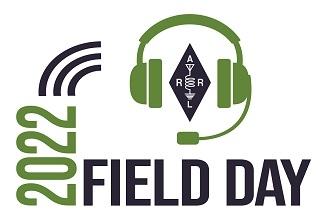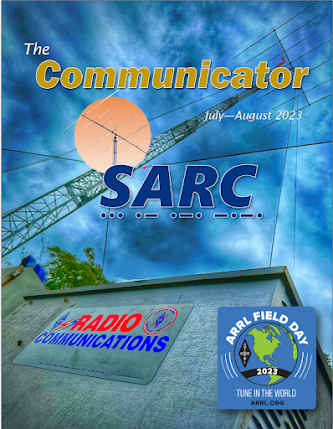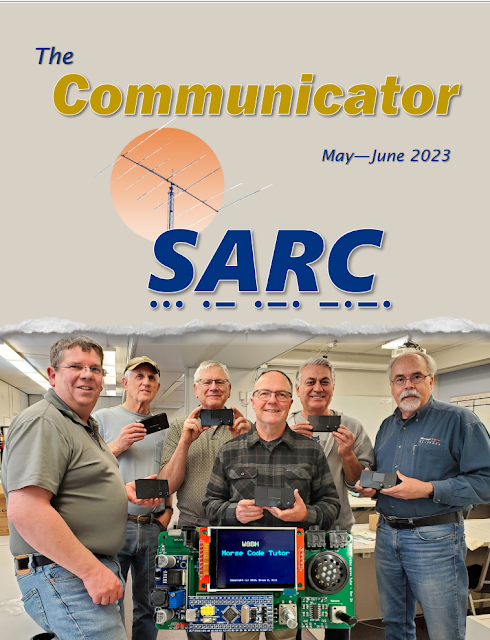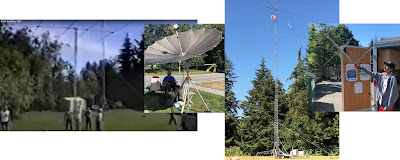“Who ya’ gonna call? Radio Hams!”
Emergency Communications Exercise June 26-27
Despite the Internet, cell phones, email and modern communications, every year whole regions find themselves in the dark, or worse. Tornadoes, earthquakes, fires, storms, landslides, ice and even the occasional cutting of cables leave people without the means to communicate. In these cases, for over one-hundred years the one consistent service that has never failed has been Amateur Radio. These federally certified radio operators, often called “hams” provide backup communications for everything from community events to local Emergency Operations Centres. Surrey “hams” will join with thousands of other Amateur Radio operators testing their emergency capabilities this weekend.

In recent years, the news has been full of reports of ham radio operators providing critical communications during unexpected emergencies around the globe. When communications become overloaded or fail, Amateur Radio’s people are often the first to provide rescuers with critical information and communications. On the weekend of June 26-27, Surrey’s ham radio operators will join with thousands of similar groups and individuals throughout Canada and the United States, using a variety of voice and data techniques in an annual exercise of emergency communications capabilities known as “Field Day”. This annual event is recognized throughout North America, and locally through a civic proclamation by Surrey City Council designating June 20-26 as “Amateur Radio Week”. Self-sufficiency is the key. Using only emergency power, ham operators will construct emergency stations in parks, parking lots, schoolyards and backyards throughout the continent and operate without commercial infrastructure for the duration of the 24-hour exercise. Their slogan, "When All Else Fails, Ham Radio Works” is more than just words to the hams, as they prove they can send messages in many forms without the use of phone systems, the internet or any other infrastructure that can be compromised in a crisis. More than 38,000 amateur radio operators across the continent participated in last year's event.
Surrey Fire Service Assistant Chief Shelley Morris, who coordinates emergency response for the City of Surrey adds: “Amateur Radio plays an integral part in emergency preparedness during any major disaster for the city. They train extensively and they operate a communications room out of our Number One fire hall. They play a very important role keeping backup communications for the operations centre up and running during a major disaster and providing enhanced life safety for the citizens of Surrey.”
Gord Kirk, coordinator for the Surrey Emergency Program Amateur Radio (SEPAR) group highlighted the value of Amateur Radio in its flexibility. “Amateur Radio is not centralized. There is no single point of failure; it does not rely on the Internet, a power utility or a communications company, cell towers or other infrastructure to provide service. It works when nothing else is available. In partnership with the Surrey Amateur Radio Communications (SARC) group we provide knowledgeable people, sophisticated equipment, and thousands of volunteer hours annually to support the City of Surrey Emergency Program. Once set up, we need nothing between us but air.”
The SARC group supports SEPAR by providing equipment, infrastructure and technical assistance. SARC President John Brodie commented that: “We are fortunate that what hams enjoy as a technically-challenging hobby can make a vitally important contribution to emergency communication during a crisis”.
The Surrey team placed first in their Canadian category in recent years. The event takes place from 11am Saturday, June 26th to 11am Sunday, June 27th. While this is normally a public affair, due to current COVID restrictions there are no public demonstrations, although in past years the technology shown has included contact with astronauts orbiting in the International Space Station. This year, smaller stations and individuals will participate from several neighbourhoods in Surrey.
Amateur Radio is growing in Canada and requests for training have increased significantly since COVID restrictions started. Hams socialize daily through radio contacts and the basic equipment to communicate worldwide can be purchased for less than $50. You no longer require Morse code, although it is still used in the hobby. Amateur Radio is practiced as a hobby, as a sport, and as a reliable means of communications by outdoors enthusiasts and others where cellular telephone towers do not exist. There are now over 30,000 Amateur Radio licensees in Canada, and more than 2.5 million around the world. Through the Amateur Radio emergency services program, ham volunteers provide both emergency communications for thousands of provincial and local emergency response agencies and non-emergency community services too, all for free.
To learn more about Surrey Emergency Program Amateur Radio visit http://separ.ca/. To learn more about Amateur Radio visit http://www.rac.ca/. See what modern Amateur Radio can do.
In a nutshell:
Surrey Field Day Overview
SUMMARY: An
emergency preparedness exercise to establish long distance communications capabilities
in support of the City of Surrey Emergency Program. Surrey Amateur Radio
operators will set up a field station simulating emergency conditions, without
using commercial services, to contact thousands of other hams throughout North
America and beyond, in the continent’s largest ham radio on-air event. This
team placed first in their Canadian category for Field Day 2018. They will be
looking to better their score in 2022 after COVID prevented team participation
for the past two years; the public is invited to observe contest operations,
see ham radio’s new capabilities, experience a moon-bounce contact, view a
satellite contact and learn how to obtain their own Industry Canada radio certification.
WHO: Federally certified
Amateur Radio Operators supporting the City of Surrey Emergency Program.
WHAT: Hams will
set up and operate field radio stations to contact other hams throughout
Canada, the US and beyond over 24 hours using a variety of modes including
voice radio, Morse code, satellites, and digital. The objective is to see who
can make the largest number of contacts during the exercise period.
WHERE: The Surrey
Emergency Program facility at 5756 142 Street, Surrey BC.
WHEN: Operations
11 am Saturday, June 25 to 11 am Sunday June 26.
WHY: Participation
in the amateur radio community Field Day. Amateur Radio operators’ emergency communication skills under adverse conditions with
generators, battery-powered equipment and portable antennas.
Special
awards are given for “alternative” power sources such as solar, wind and other
means. Field Day is a competition as well as a “trial run” for emergency
communication skills used during disaster situations
Our Amateur
Radio volunteers will accommodate photo opportunities, interviews, and profiles
of the activities of both our participants in an important national Amateur
Radio event and their role in the Surrey Emergency Program. There is an
opportunity to see all Amateur Radio communication modes in action, including
voice, Morse code, satellite, and digital. There will be opportunities for the
public to participate, including activities geared toward children.
There will
be opportunities to explore the relationship to other facets of the Surrey
Emergency Program.
Sponsors and
participants:
- ·
Surrey Emergency Program Amateur Radio
- ·
Surrey Amateur Radio Communications
- ·
Surrey Fire Service
- ·
Surrey Emergency Program






























